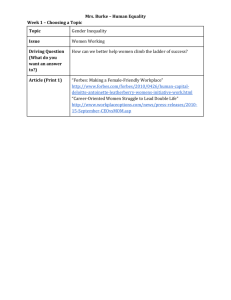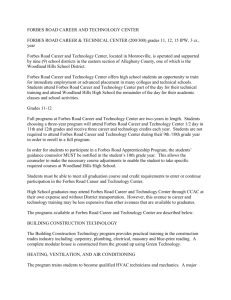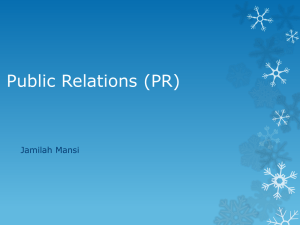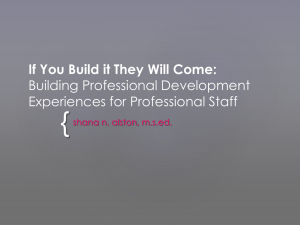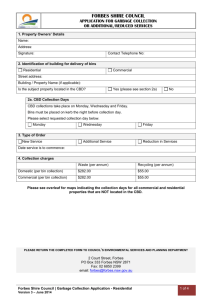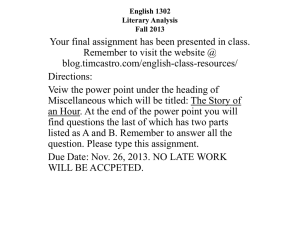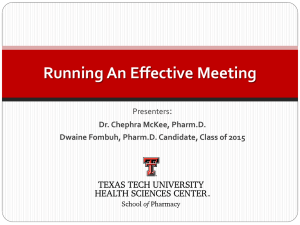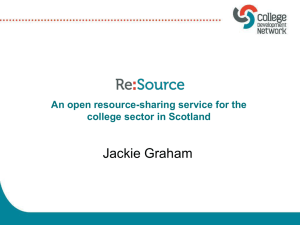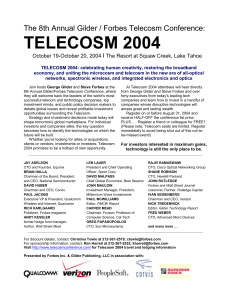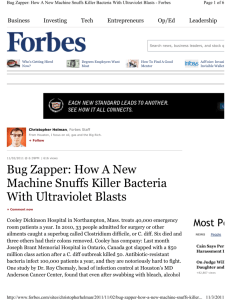Click here to view the presentation.
advertisement
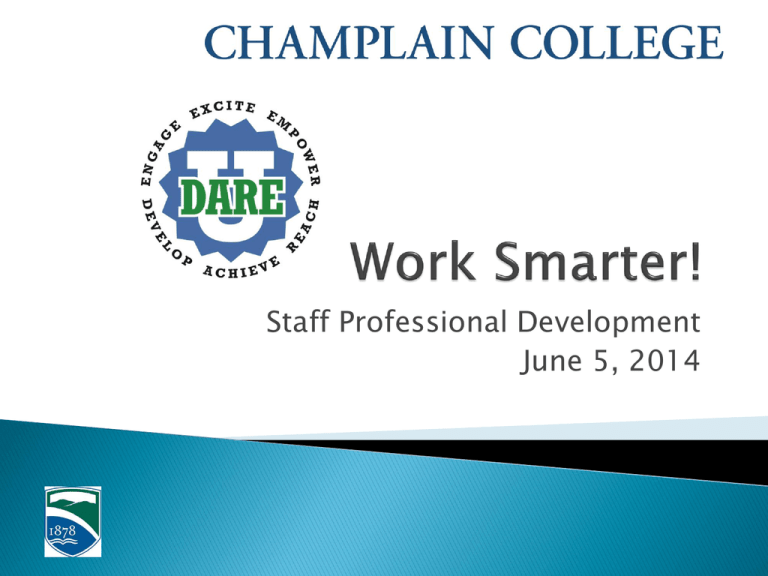
Staff Professional Development June 5, 2014 What is Working Smart? Boosting Your Brain Function Tips for Working Smarter Brainstorm Work: A job or activity that you do regularly to earn money; the place where you do your job; the things that you do as part of your job. (Miriam Webster) Smarter: Very good at learning or thinking about things; showing intelligence or good judgment. (Miriam Webster) Working Smarter: An empowered state of habitually and strategically achieving more goals, more often. -Visa Development http://vista-development.com/ws/working_smart.htm Stephen Covey tells a story about a woodcutter who’s saw gets more blunt as time passes and he continues cutting down trees. If the woodcutter were to stop sawing, sharpen his saw and go back to cutting the tree with a sharp blade, he would actually save time and effort in the long run. What does this mean? Having a balanced program for self-renewal in the areas of our life: physical, social/emotional, mental and spiritual. http://blog.bufferapp.com/5-ways-to-get-more-done-by-workingsmarter-not-harder Attention Span ◦ On average our brains are only able to focus for 90 minutes and need at least 20 minutes rest. http://blog.bufferapp.com/5-ways-to-get-more-done-by-workingsmarter-not-harder Take a Nap! Research indicates that when memory is first recorded in the brain, it is ‘fragile’ and easily forgotten, especially if the brain is asked to memorize more things. By taking a nap, you are pushing memories to the “more permanent storage” preventing them from being “overwritten”. http://blog.bufferapp.com/5-ways-to-get-more-done-by-workingsmarter-not-harder Study of participants that did remarkably better on a test following a nap vs. those that did not sleep. http://blog.bufferapp.com/5-ways-to-get-more-done-by-workingsmarter-not-harder By spending time in nature, it helps to reset our attention span and relax our minds. Experiment by Daniel Goleman (author of Focus: The Hidden Power of Excellence) studied the difference of walking down a busy city street vs. a quiet park. The level of attention needed to navigate a busy street is high enough that the walk doesn’t let the brain relax to reset our focus levels. http://blog.bufferapp.com/5-ways-to-get-more-done-by-workingsmarter-not-harder Be Happy! Learn to maintain a positive state of mind. Shawn Anchor – American educator, author and speaker known for his advocacy of positive psychology. http://www.ted.com/playlists/60/work_smarter Don’t Check eMail First Thing… ◦ Your brain gets overwhelmed with information and ideas, and your personal objectives and goals start to slip. ◦ Leave emails to early in the afternoon. http://www.forbes.com/sites/laurashin/2014/01/ 15/how-to-perform-at-your-peak-every-day10-tips-for-working-smarter-in-2014/ Prioritize Top 3 Goals ◦ Prioritize your top 3 Goals for the day first thing or the last thing of each day for the next day. ◦ You can remember 3 things to do in a day relatively easily. http://www.forbes.com/sites/laurashin/2014/01/ 15/how-to-perform-at-your-peak-every-day10-tips-for-working-smarter-in-2014/ Meetings ◦ Stand Up meetings On average 34% less time than stand up meetings. Sitting is the ‘new smoking’. ◦ Walking Meetings Need to grab a few extra steps to reach 10,000? Schedule walking meetings for your next 1:1. (http://nymag.com/scienceofus/2014/05/work-smarter-for-shorter-meetings-stand-up.html) Get Moving! ◦ ◦ ◦ ◦ Get up and stretch Take a break - go for a 5-10 minute walk Get a cup of coffee or water Attend a fitness class at lunch “Your ability to make great decisions is a limited resource.” Conserve your Decision-Making Energy at Every opportunity. ◦ Become disciplined about not paying attention to non-urgent tasks until it is essential: Turn off phone during meetings. Don’t expend energy thinking about a project until you have all the information you need. Delegate http://www.forbes.com/sites/laurashin/2014/01/ 15/how-to-perform-at-your-peak-every-day10-tips-for-working-smarter-in-2014/ Protect Quality Thinking Time ◦ If you’ve got a particularly challenging issue or project, devote 30 to 60 minutes a day, or several hours 1-day a week (block the time on your calendar). ◦ Find a quiet space in your office area to work. ◦ Turn off all distractions (email, phone ringer, etc). http://www.forbes.com/sites/laurashin/2014/01/ 15/how-to-perform-at-your-peak-every-day10-tips-for-working-smarter-in-2014/ Single – Task ◦ Is there really such a thing as multi-tasking? ◦ Our brains can really do only one thing at a time. ◦ Multi-tasking between 2 activities takes the same amount of time as it does to do a 1 task at a time. ◦ Have 2 priorities? Do them 1 at a time! http://www.forbes.com/sites/laurashin/2014/01/ 15/how-to-perform-at-your-peak-every-day10-tips-for-working-smarter-in-2014/ Take Care of Yourself – Carve out Down Time ◦ ◦ Take your vacation time. Unplug! Do not check your email messages while on vacation. http://www.forbes.com/sites/laurashin/2014/01/ 15/how-to-perform-at-your-peak-every-day10-tips-for-working-smarter-in-2014/ Recognize Your Accomplishments ◦ ◦ No matter how small, or how large – celebrate! What do you do to recognize achievement? http://www.forbes.com/sites/laurashin/2014/01/ 15/how-to-perform-at-your-peak-every-day10-tips-for-working-smarter-in-2014/ Allow your brain to recharge Respect the attention span Take a Nap Be Happy Prioritize your tasks Think about different ways to have your meeting Get moving Think about when you do your best thinking – and save that for decision making Schedule project and concentration time in your calendar Think about if you can really multi-task Take your vacation time Recognize your accomplishments What are Work Smart Tips you have used? Why have they worked?
